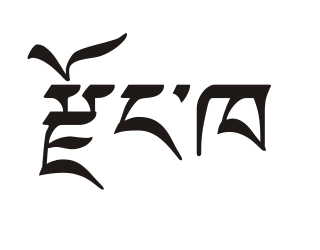
Bhutan comprises twenty districts.

Gasa District or Gasa Dzongkhag is one of the 20 dzongkhags (districts) comprising Bhutan. The northern part of Gasa District is a disputed zone under the control of the People's Republic of China. The capital of Gasa District is Gasa Dzong near Gasa. It is located in the far north of the county and spans the Middle and High regions of the Tibetan Himalayas. The dominant language of the district is Dzongkha, which is the national language. Related languages, Layakha and Lunanakha, are spoken by semi-nomadic communities in the north of the district.

Tsirang District, is one of the 20 dzongkhags (districts) of Bhutan. The administrative center of the district is Damphu

A dzongkhag is an administrative and judicial district of Bhutan. The twenty dzongkhags of Bhutan are further divided into 205 gewogs. Some larger dzongkhags have one or more of an intermediate judicial division, known as dungkhags (sub-districts), which themselves comprise two or more gewogs. The Parliament of Bhutan passed legislation in 2002 and 2007 on the status, structure, and leadership of local governments, including dzongkhags. Its most recent legislation regarding dzongkhags is the Local Government Act of 2009. A dzongkhag is headed by a dzongdag, who is an elected official.

A gewog, in the past also spelled as geog, refers to a group of villages in Bhutan. The head of a gewog is called a gup. Gewogs form a geographic administrative unit below dzongkhag districts, and above Dzongkhag Thromde class B and Yenlag Thromde municipalities. Dzongkhag Thromde class A municipalities have their own independent local government body.

Dungna Gewog is a gewog of Chukha District, Bhutan. The gewog has an area of 165.4 square kilometres and contains 9 villages.

Phuentsholing Gewog is a gewog of Chukha District, Bhutan. The gewog has an area of 139.8 square kilometres and contains 19 villages. Phuentsholing Gewog is part of Phuentsholing Dungkhag, along with Dala, Logchina Gewogs and Shampheling Gewog. It is one of the highest populated gewog in Chukha Dzongkhag.

Bji Gewog is a gewog of Haa District, Bhutan. In 2002 before substantial border changes the gewog had an area of 832 square kilometres and contained 8 villages and 234 households.

Chiwogs of Bhutan or chios refer to the 1044 basic electoral precincts of Bhutan. Chiwogs are also former third-level administrative divisions of Bhutan below geos. Until 2009, they were the equivalent of municipalities or parishes, containing clusters of villages and hamlets. There are generally 5 or 6 chios in each geo, and in turn several geos in each dzongkha (district). To illustrate, there are 50 chios in Paro District alone. The majority of chios are small rural communities; more densely populated areas tend to be separate thromdes, or municipalities. A Chiwog Disaster Management Plan (CDMP) exists in some chios to form an effective responsive to any local disasters. Often, participants in the CDMP are also trained at a geo level for better coordination.

Norbugang Gewog is a gewog of Pemagatshel District, Bhutan. Norbugang Gewog is part of Nganglam Dungkhag, along with Dechenling and Nganglam Gewogs.

Jamkhar Gewog is a gewog of Trashiyangtse District, Bhutan.

Toetsho Gewog is a gewog of Trashiyangtse District, Bhutan.

Yangtse Gewog is a gewog of Trashiyangtse District, Bhutan. It was formerly known as Trashiyangtse.

Yalang Gewog is a gewog of Trashiyangtse District, Bhutan.

A thromde is a second-level administrative division in Bhutan. The legal administrative status of thromdes was most recently codified under the Local Government Act of 2009, and the role of thromdes in elections in Bhutan was defined in the Election Act of 2008

Ramjar Gewog is a gewog of Trashiyangtse District, Bhutan.

Khamdang Gewog is a gewog of Trashiyangtse District, Bhutan.

Bumdeling Gewog is a gewog of Trashiyangtse District, Bhutan.











